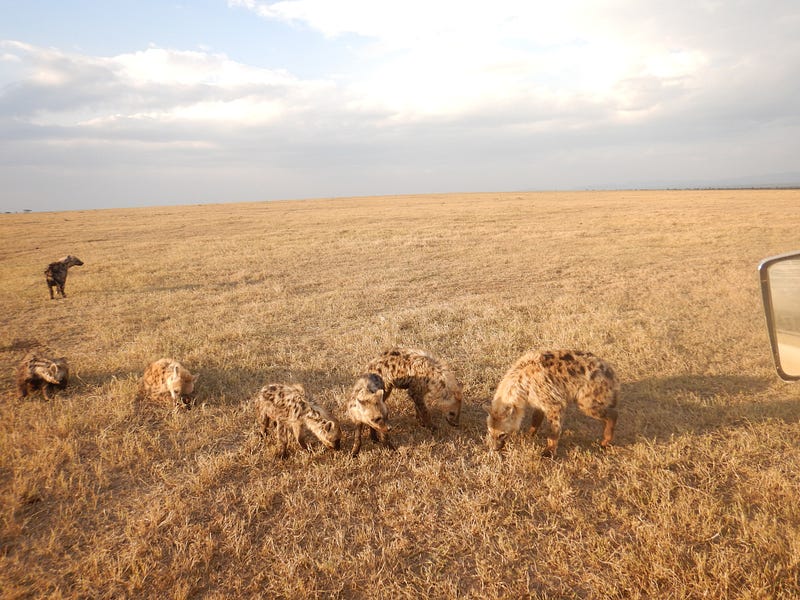
A Waning Symphony of the World’s Great Living Concert
The window is open to the night air. The cool, almost cold of this equatorial night flows in across the floor and touches my lower back as I type. The power comes on in about an hour, and with that, the wifi. It doesn’t come out as far as my room so in order to be able to work online, I have to walk through the dark to the tables where I can plug in. I will pick up all my electronics, make my way down the gravel path to the kitchen. I will still be outside, as there is nowhere to work in the building.
Whatever animals are in the area, whatever hyenas or lions or gazelles or porcupines happen to be meandering through, I am sharing the air with them. They don’t scare me. Respect is different from fear. Learning how to give space to creatures of the night, to make room for those whose world this was long before me, is part of being in the symphony.
As a child of the woods, I grew up with night sounds. Granted, what the Florida nights offered me was not the near-distant sounds of a lion’s roar, the hyena’s howl or the great, slow rustling of elephant feet accompanied by breaking branches. Still it was a symphony of wind, frogs singing by the tens of thousands and the almost-spooky whippoorwill and chuck-will’s-widows as the swooped to catch insects.
Those sounds are silenced now. The trees and deep woods which housed the creatures of the night are covered with concrete. Windows which once allowed the dense scent of gardenias to waft over my four-year-old-face the same way that the night air touches my skin are shut to the night air, all sounds and scents walled off for a sterile environment.
Safe. Or so we think. From that big bad world out there.
I am now at the tables at The Stables, which is what these accommodations are called. It’s nearly impossible to photograph the light that I am seeing right now. When there is a low cloud cover, as with right now, the rising sun paints everything a strange pinkish-yellow unlike any other place I’ve ever been.
The light reminds me of those brief, shimmering moments when in Colorado or out on the ocean, a bank of clouds cants the sunlight in such a way that the light touches everything: trees, water, creatures, with an off-worldly glow.
You have to be outside, you have to present, to see the light. That’s also part of the symphony.
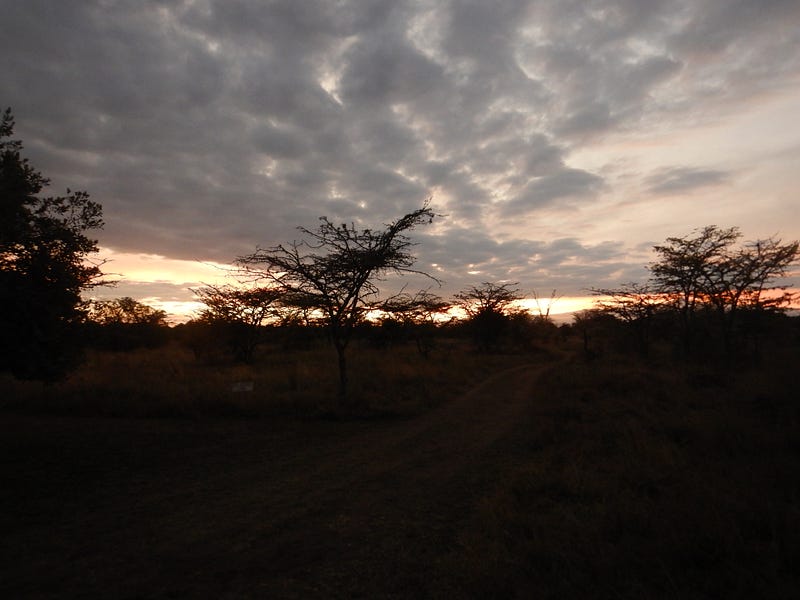
In The Great Animal Orchestra,Finding the Original Music of the World’s Wild Places, author Bernie Krause speaks to what once was and what we are losing far too fast. Far too many of us, especially those much younger whose eardrums are being blasted to smithereens by too-loud music from their devices, have no idea what the world truly sounds like. Nor do they feel the slightest bit at ease when they do hear the world in all its swiftly-diminishing glory.
As the sun comes up, the “go away” bird (clearly a cousin of our jays) and a host of other wildlife chirp up. The local starlings, an iridescent, cheeky bird of great beauty, hops onto the table to steal any bit of food not covered. So too the chattering, eager and unbelievably swift Vervet monkies whose ear-pounding run across the tin roof sounds like an attacking hoard, and whose lightning-fast reflexes can relieve you of an apple or treat before you can blink.
Such noises are combined with the clink of spoons stirring coffee, low conversations and mumbles of Jambo (Swahili greeting) among those stumbling into the early morning.
That is also part of the music, but all too often is like a Béla Bartók symphony, full of dissonance and clashing tones. For my ear, deeply unpleasant. For our part of the symphony has all too often been full of blood and guns and destruction and devastation, bombs and fires and destruction all fueled by greed, ignorance, hate and misplaced desires.
We destroy what we dominate. We dominate what we fear. These days we fear just about everything, most especially each other. At least in that regard, there’s damned good reason to be wary.
One girl who has been at The Stables is terrified of insects. The loss of insect populations, because they are “inconvenient,” has wiped out billions of birds and more species every year. She sprays her room full of insecticide, and hates snakes, hates spiders. And she has this belief that she understands conservation. Conservation isn’t a convenience. It’s a way of life. We accommodate Nature, not the other way around.
This great, vast place of Ol Pejeta is barely a blip, a tiny dot on the continent of Africa. At least here, when I open my window at night (and invite in all manner of curious creatures most of whom will toss my trash can, and did) I feel the breeze on my face, full of spices and the distant smells of elephant feces and the cries of animals on the hunt and those being hunted.
That is my music.
Krause explains that each and every sound made in nature is part of how those creatures communicate. They can sense predators, mating partners, the sound of joy, announcements of danger such as the red-billed oxpecker, whose cry tells a giraffe or rhino a predator lurks nearby.
Including us. We are the worst. For as better writers than I have long been pointing out, we kill for sport and fun and pure meanness.
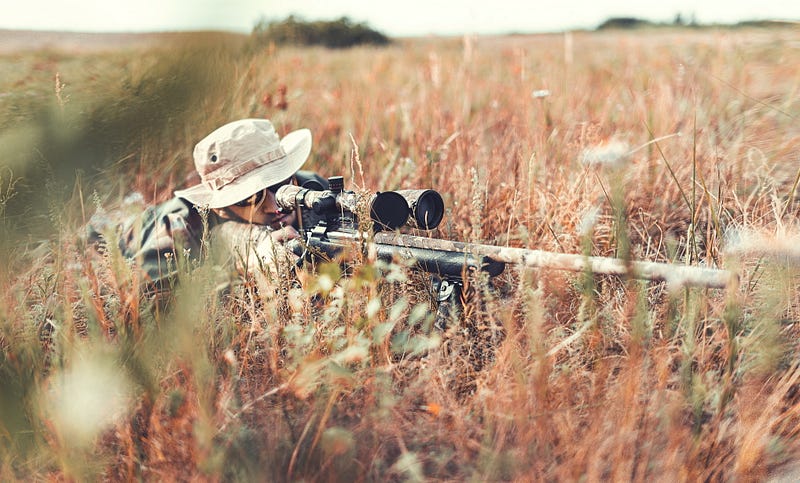
When I return to places like the Amazon, the deep forests of Croatia, the wild, immensely lonely open spaces of Iceland, I hear what is left of the symphony. What we are doing is removing instruments, here a clarinet, there a bass drum, here the first violin, there the French horn, until there are only a few players remaining. The reference points of those creatures are gone. Some, far too many, forever.
And so is their music gone forever.
It is the diversity of that music which makes it so breathtaking. Silence, such as the silence along the Ring Road of Iceland, has its own stunning beauty. Today, most of us can’t even bear silence for fifteen minutes. Instead, we impose our offensive boombox speakers on other people’s eardrums as we hike, we bring our overbearing, bullying loudness into the quiet spaces of the world where there is less music to hear.
If I want to hear crickets at night, in too many places I have to buy a sound machine.
That is a travesty.
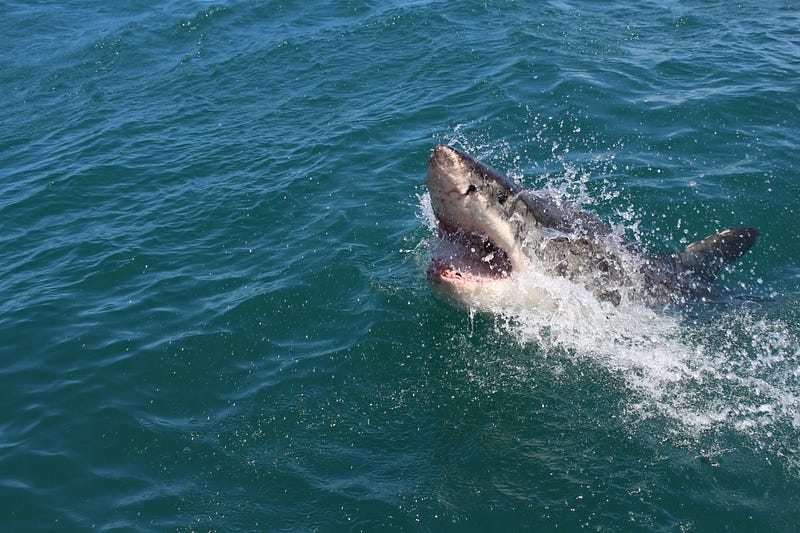
We destroy what we fear. The world’s sharks are disappearing into trophies or fin soup. I have swum with Great Whites off the coast of Gansbaai. These are beautiful, magnificent animals, to be respected, not feared. They are part of the ocean’s symphony. Yet due to ignorance, greed and fear, we are wiping out a keystone species in the world’s waters.
That is a travesty.
We are the travesty, not all of us, but too many. We are disappearing the earth’s greatest songs, the music we were given to enjoy, celebrate, bask in.
We were given dominion, which to my mind means stewardship. That wasn’t wholesale permission to pick off the artists one by one like a shooting gallery, which in this case is an apt description.
This is why I travel. This is why I come to Ol Pejeta. This is why I want you to consider either coming here or supporting their work. For because of these great places, you can still be awakened in the early hours by the roars of mating lions, the sound of chattering monkeys, the pounding of rhino hooves and the crash of an elephant through the brush, her tiny baby right behind.
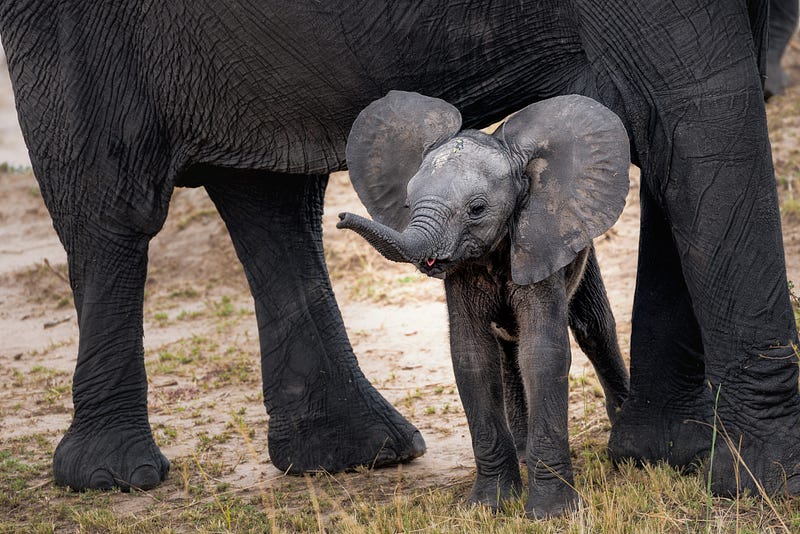
The more you explore the less you fear. The more you experience, the more you hear. And the more you hear of the true Earth’s music, the more determined you will be to protect who is left to sing for us, and to bring back some we have almost lost.
I hope you choose to hear their songs..
If you are interested in donating to this conservancy, please see https://donate.olpejetaconservancy.org/
There are many ways to get involved and support good work all over the world. Please do your due diligence before donating, and kindly consider coming to visit. I guarantee this: you will never be the same.
Comments powered by Talkyard.